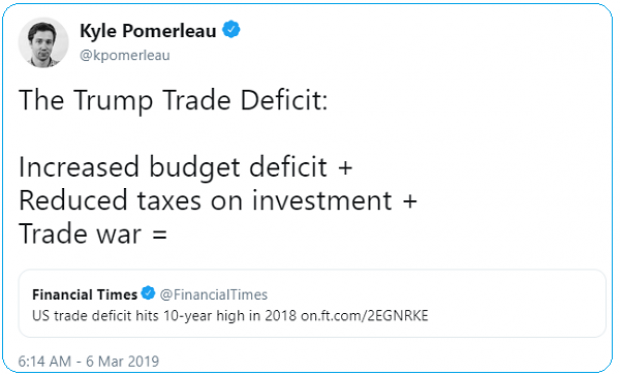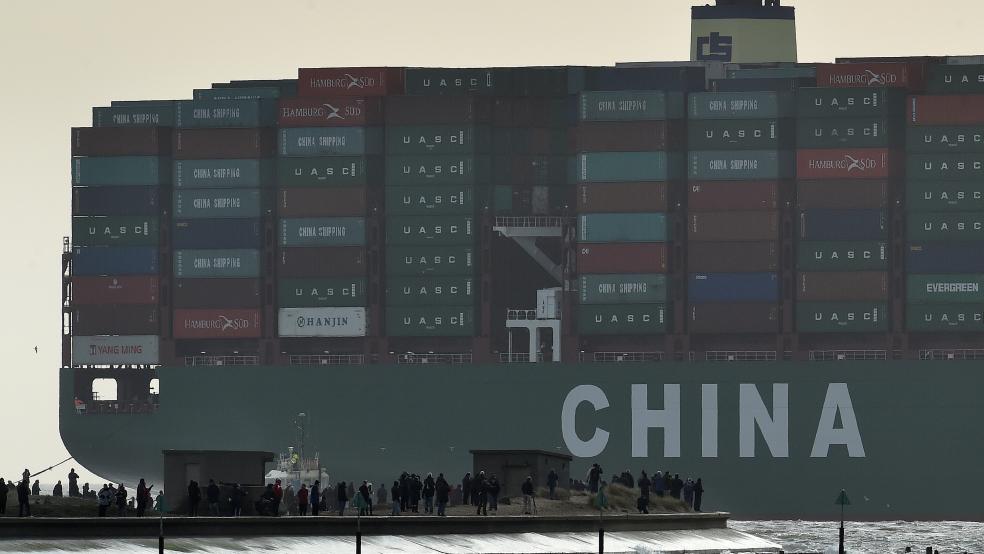President Trump’s efforts to reduce the trade deficit don’t seem to be working – and his fiscal policies are almost certainly making the situation worse.
The U.S. trade deficit in goods hit its highest level ever last year, rising to $891 billion, the Bureau of Economic Analysis said Wednesday. The trade deficit with China also rose to a record level, hitting $419 billion.
The overall trade deficit, which includes a substantial surplus in services, rose to $621 billion – short of the record $838 billion seen in 2006, but more than $100 billion larger than when Trump first took office.
What’s driving the trade deficit: While the dynamics of trade are complex, economists say the widening trade deficit is driven by factors such as a global economic slowdown and a strong U.S. dollar, which amplify long-term trends such as foreign investment flows coming into the United States and a relatively low domestic savings rate.
The $1.5 trillion tax cut signed by Trump in 2017 exacerbated existing imbalances. “The immediate drivers of the surge in the trade deficit under Trump have been the fiscal expansion resulting from the tax cuts he pushed through Congress and the stronger dollar that resulted, partly from the juiced economy that expansion helped create,” Bloomberg’s Shawn Donnan wrote.
Trump’s trade war with China also played a role, reducing American farm exports as tariffs kicked in last year.
Kyle Pomerleau of the conservative Tax Foundation summed up the growing trade deficit in simple terms:

It should come as no surprise: Almost all economists agree that Trump’s trade war is misguided at best, and when combined with massive tax cuts, the overall policy will produce the opposite of what the president says he wants. An analysis of then-candidate Trump’s trade proposals by Leonard Burman of the Tax Policy Center back in 2016 sums up the dominant view:
“Republican presidential contender Donald Trump often expresses dismay about the US trade deficit, which he ties to the loss of good paying middle class jobs. The issue is more nuanced than Mr. Trump suggests, and his plan to impose giant tariffs on China and other countries won’t create jobs or even necessarily reduce the trade deficit. Even more damaging, his tax proposals could double our trade deficit from $500 billion to as much as $1 trillion at current income levels.”
What could reverse the trend? A trade deal with China, which the White House says could be announced at any moment, won’t have much of an effect on the trade deficit, economists say. William Reinsch of the Center for Strategic and International Studies told The Washington Post that an economic downturn may be the most reliable way to reduce the deficit: “If you want to lower the trade deficit, have a recession,” Reinsch said.
Short of a recession, though, the trend is likely to continue. Andrew Hunter of Capital Economics said he expects imports set to grow even as a global slowdown weighs on exports.
The bottom line: Contrary to President Trump’s insistence that trade balances provide a scorecard of some sort in the battle between nations, most economists say the focus on the trade deficit is unwarranted. Nevertheless, the president is failing to deliver on one of his key economic promises, and his own fiscal policies bear much of the blame.




